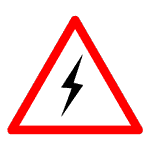 Electrical safety at home is an important consideration. Electricity is dangerous and can cause injury and death. A healthy respect for the dangers is a necessity before attempting any electrical repair.
Electrical safety at home is an important consideration. Electricity is dangerous and can cause injury and death. A healthy respect for the dangers is a necessity before attempting any electrical repair.
Do you have an electrical project you need to work on? See the article 'Basic Residential House Wiring' or 'Home Electrical Repair' for more information and a listing of electrical repair projects.
The following are some basic tips for 'Electrical Safety at Home':
TURN POWER OFF - This is the most important safety tip. Never work on electrical devices or wiring when the power is on. Even when you think you have turned off the breaker, check with a voltage tester before beginning work. The quickest way to get shocked is to start working on an electrical item when you think the power is off and it isn't.
Turn Breakers Off - Don't assume that just turning off a switch is enough. It is just too easy for someone to flip a switch on accidently. Turn off the breaker at the main panel.
Tag Breakers - An added precaution to turning off a breaker is tagging it. Put a piece of tape over the breaker with a note on it not to turn it on. Do others in your house know how to check the breaker panel for tripped breakers. If the stereo goes off, will they check there before they ask you?
Notify Others - Let the whole family know when you are working on an electrical item. This will help to eliminate the chance that someone will turn something on.
Check For Power at Boxes - Even after you have turned off a breaker you want to make sure the power is off at the location you are working on. It is possible for more than one circuit to be going through the box you are working on. It is also possible that you turned off the wrong breaker. Use a voltage tester, such as a non-contact baterry operated one, to make sure the power is off.
For more information on electrical safety, see the 'Electrical Safety Tips' below. Electrical safety at home should be your first concern when doing this type of repair.
Electrical Safety Tips
We have listed some common Electrical Safety Tips below. This list focuses on issues related to making repairs in your home. Although this list may not be comprehensive it gives a good idea of what to watch for.
Also check out the websites that are listed on the page 'Electrical Safety Information'. They provide information on all aspects of electrical safety in your home. The EFSI has an entire website devoted to electrical safety. Develop a healthy respect for electricity, use good judgment, stay alert and take precautions. Accidents can be avoided if you do.
Turn Off the Power - This is a very important electricity safety tip. If there is no power you can't get shocked. Turn the breaker off the feeds any item that you are working on. Don't just trust the light switch. You can still have power in the box.
Tape the Breaker - Tape the breaker in the off position. Mark it so that everyone knows that you are working on it. Go one step further, tell everyone in your home that you are working on the power and 'not to touch the breaker panel'.
Use a Tester - When you open up a fixture or electrical box, use a tester to make sure none of the wires are hot. It is possible for more than one circuit to be fed through a single box. It is also possible that you got the wrong breaker turned off. Check all the wires with a tester. Make sure you know how to use the tester.
Stay Alert - Always be conscious of the fact that you are working on electricity.
Personal Protective Equipment - Wear non conductive shoes and gloves when working on electrical devices. Even if you are sure the power is off, don't touch bare wires with any part of your body.
Insulated Tools - Never use screwdrivers, pliers or strippers with metal handles. Make sure your tools are properly insulated before you work on any electrical wiring project.
Insulated Ladders - Never work on a metal ladder. Use wooden or fiberglass ladders with insulated feet.
Wet Locations - Never work on electricity or use electrical devices in wet locations. Any receptacle that is near a wet location should be GFCI protected.
Power Lines - Never work near or use a ladder near power lines. You cannot shut the power off to these lines and you can be killed if you come in contact with them.
Inspect Power Tools - Make sure the cords and plugs are in good condition on your power tools. Never use a tool with a missing ground prong. Never take the ground prong off a cord or tool.
Inspect Extension Cords - Make sure extension cords are not damaged in any way. No exposed wire, not cuts or breaks and the ground prong is intact.
Proper Loads for Circuits - Do not overload your circuits. This can be done by putting too many items on one circuit. Using multiple outlet splitters is not a good idea.
Know What You Are Doing - Do not attempt any repair if you are unsure of how things should be hooked up. Follow the the instructions that come with devices you are installing.
The above list of electrical safety tips does not cover every possible electrical safety issue. However, it does give you good guidance and makes you aware of potential dangers.
Electrical Safety Information
The importance of reading electrical safety information cannot be stressed enough. Once you are used to safe procedures, it is no big deal. For someone that is unfamiliar with electricity, all it takes is one mistake.
The Electrical Safety Foundation International has an excellent website that deals with electrical safety. Make sure you check this website for additional electricity safety tips. This link takes you to the Home Safety Page, for this website. They also have an Electrical Safety Workbook, that you can download for free. You will definitely want to review this information before you begin any electrical repairs.
Another website that has some good information is the Canadian Centre for Occupational Health and Safety. The link takes you to the Electrical Safety page. They also have an excellent check list that you can use to evaluate your home's electrical safety. Use this link, Home Electrical Safety Checklist , to get to the pdf file.
On construction sites it is a common practice to do a Task Hazard Analysis before starting an activity. In this analysis the potential dangers are identified and then the preventative steps to be taken are outlined. A similar practice at the home level is a good idea. What are the dangers of your electrical repair? Have you made sure the power is off? Do have the proper non-conductive PPE (Personal Protective Equipment)? Do you have the right insulated tool? Are you going to use an insulated ladder?
Do you have an electrical project you need to work on? See the article 'Basic Residential House Wiring' or 'Home Electrical Repair' for more information and a listing of electrical repair projects.
WARNING!! FOLLOW ALL OF THE AVAILABLE SAFETY GUIDELINES WHEN WORKING AROUND ELECTRICITY!!!

